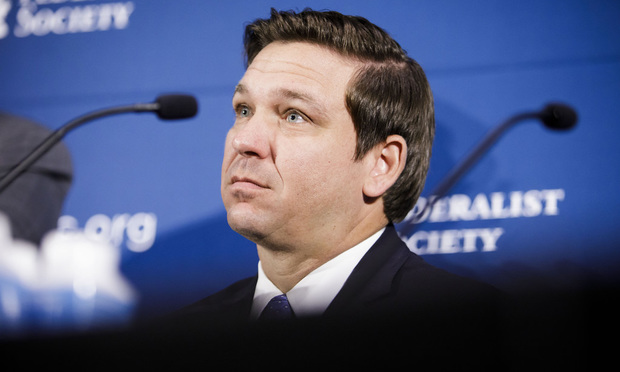Under Pressure, Florida Governor Issues Statewide Stay-at-Home Order
Gov. Ron DeSantis issues the order after consulting with President Donald Trump and White House advisers, who say Americans need to stay home through April.
April 01, 2020 at 01:51 PM
3 minute read
 Gov. Ron DeSantis. Photo: Diego M. Radzinschi
Gov. Ron DeSantis. Photo: Diego M. Radzinschi
Gov. Ron DeSantis issued a statewide stay-at-home order Wednesday as federal and local pressure mounted for him to abandon the county-by-county approach he had implemented.
DeSantis told reporters that he is issuing the order after consulting with President Donald Trump and White House advisers, who have said that Americans need to stay home through April.
DeSantis' move came hours after the U.S. surgeon general, Dr. Jerome Adams, said on NBC's "Today" show that he would tell DeSantis that the federal guidelines for social distancing should be viewed as "a national stay-at-home order."
The state's confirmed cases are approaching 7,000, with 87 deaths and almost 900 people hospitalized, and an outbreak model cited at the White House shows exponential growth in the coming weeks. More than 30 others states had already issued such orders, including other large states like California, New York and Illinois, which acted more than a week ago.
On Tuesday, Florida's Democratic congressional delegation blasted DeSantis for failing to impose a statewide lockdown, saying the virus does not respect county lines.
DeSantis had been defending his county-by-county approach, saying it wouldn't be fair to lock down the small, mostly rural counties with no or few confirmed infections. He issued a stay-at-home order Monday for Miami-Dade, Broward and Palm Beach counties and the Florida Keys, last week ordered anyone arriving from the New York area and Louisiana into quarantine and issued some statewide measures such as closing bars and gyms and limiting restaurants to takeout and delivery.
Counties in the Tampa Bay area and central Florida issued their own lockdown orders and Jacksonville announced Wednesday that it would join them on Friday.
A University of Washington model is projecting that Florida will see a rapid increase in the number of deaths and hospitalizations in April, with 100 people dying daily by mid-month and over 175 by May 1, when the number nears its peak. It predicts that 10,000 people will be hospitalized by mid-month and 20,000 on May 1. The model predicts that more than 6,500 Floridians and more than 90,000 will die nationally from the virus by June 1.
Brendan Farrington and Terry Spencer report for Associated Press.
Related stories:
Update on Florida Court Rule Changes in Response to COVID-19
15 New York Judges Have Coronavirus; First Death Recorded
NOT FOR REPRINT
© 2025 ALM Global, LLC, All Rights Reserved. Request academic re-use from www.copyright.com. All other uses, submit a request to [email protected]. For more information visit Asset & Logo Licensing.
You Might Like
View All
Climate Disputes, International Arbitration, and State Court Limitations for Global Issues
![Judicial Face-Off: Navigating the Ethical and Efficient Use of AI in Legal Practice [CLE Pending] Judicial Face-Off: Navigating the Ethical and Efficient Use of AI in Legal Practice [CLE Pending]](https://images.law.com/cdn-cgi/image/format=auto,fit=contain/https://images.law.com/contrib/content/uploads/sites/276/2024/10/Image-request_767x633pxl.jpg)
Judicial Face-Off: Navigating the Ethical and Efficient Use of AI in Legal Practice [CLE Pending]
4 minute readTrending Stories
- 1Relaxing Penalties on Discovery Noncompliance Allows Criminal Cases to Get Decided on Merit
- 2Reviewing Judge Merchan's Unconditional Discharge
- 3With New Civil Jury Selection Rule, Litigants Should Carefully Weigh Waiver Risks
- 4Young Lawyers Become Old(er) Lawyers
- 5Caught In the In Between: A Legal Roadmap for the Sandwich Generation
Who Got The Work
J. Brugh Lower of Gibbons has entered an appearance for industrial equipment supplier Devco Corporation in a pending trademark infringement lawsuit. The suit, accusing the defendant of selling knock-off Graco products, was filed Dec. 18 in New Jersey District Court by Rivkin Radler on behalf of Graco Inc. and Graco Minnesota. The case, assigned to U.S. District Judge Zahid N. Quraishi, is 3:24-cv-11294, Graco Inc. et al v. Devco Corporation.
Who Got The Work
Rebecca Maller-Stein and Kent A. Yalowitz of Arnold & Porter Kaye Scholer have entered their appearances for Hanaco Venture Capital and its executives, Lior Prosor and David Frankel, in a pending securities lawsuit. The action, filed on Dec. 24 in New York Southern District Court by Zell, Aron & Co. on behalf of Goldeneye Advisors, accuses the defendants of negligently and fraudulently managing the plaintiff's $1 million investment. The case, assigned to U.S. District Judge Vernon S. Broderick, is 1:24-cv-09918, Goldeneye Advisors, LLC v. Hanaco Venture Capital, Ltd. et al.
Who Got The Work
Attorneys from A&O Shearman has stepped in as defense counsel for Toronto-Dominion Bank and other defendants in a pending securities class action. The suit, filed Dec. 11 in New York Southern District Court by Bleichmar Fonti & Auld, accuses the defendants of concealing the bank's 'pervasive' deficiencies in regards to its compliance with the Bank Secrecy Act and the quality of its anti-money laundering controls. The case, assigned to U.S. District Judge Arun Subramanian, is 1:24-cv-09445, Gonzalez v. The Toronto-Dominion Bank et al.
Who Got The Work
Crown Castle International, a Pennsylvania company providing shared communications infrastructure, has turned to Luke D. Wolf of Gordon Rees Scully Mansukhani to fend off a pending breach-of-contract lawsuit. The court action, filed Nov. 25 in Michigan Eastern District Court by Hooper Hathaway PC on behalf of The Town Residences LLC, accuses Crown Castle of failing to transfer approximately $30,000 in utility payments from T-Mobile in breach of a roof-top lease and assignment agreement. The case, assigned to U.S. District Judge Susan K. Declercq, is 2:24-cv-13131, The Town Residences LLC v. T-Mobile US, Inc. et al.
Who Got The Work
Wilfred P. Coronato and Daniel M. Schwartz of McCarter & English have stepped in as defense counsel to Electrolux Home Products Inc. in a pending product liability lawsuit. The court action, filed Nov. 26 in New York Eastern District Court by Poulos Lopiccolo PC and Nagel Rice LLP on behalf of David Stern, alleges that the defendant's refrigerators’ drawers and shelving repeatedly break and fall apart within months after purchase. The case, assigned to U.S. District Judge Joan M. Azrack, is 2:24-cv-08204, Stern v. Electrolux Home Products, Inc.
Featured Firms
Law Offices of Gary Martin Hays & Associates, P.C.
(470) 294-1674
Law Offices of Mark E. Salomone
(857) 444-6468
Smith & Hassler
(713) 739-1250








